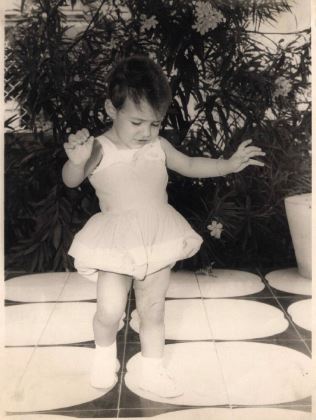About Me

My mom, two years olf, in her backyard in Victoria de Las Tunas, Cuba."
My mom, Teresita Calleja, was born in a small town in Cuba named Victoria De Las Tunas. Fidel Castro’s dictatorship had steadily tightened its grasp on Cuba. My mom’s family was one of the last to leave, “My parents weren’t really in touch with what was going on, and they didn’t think that the United States would allow Cuba to become a communist country,” she recalled. They reached their breaking point when Castro’s government took away their business first and eventually their home. “Someone just showed up one day and says this now belongs to the government. From then on, they forced us to live with five other strangers.” When my abuela and abuelo left they were only allowed one suitcase original belongings and now jewelry. My abuela had to give her wedding ring to the government. They changed the currency so if you had money stashed away, it was now worthless.
Eventually, they made it to New York City. My mother did not know English when she arrived in the United States. In Kindergarten, she did not know what the other kids were saying to her. She would repeat the words back to them. Oblivious to her circumstances, these cruel kids would nickname her “copycat.” By the end of kindergarten, she knew English. My mom went to a strict all-girls Irish Catholic school. She noticed the teachers never called on her to read to the class. The Irish nuns who had lived in the neighborhood for years teaching Irish kids. The nuns were not welcoming to the Hispanics who were now moving into the neighborhood.

My abuela and abuelo in front of their home in Cuba."
However, when I asked my mom to discuss racism for this project, she said the one instance that she remembers most occurred when she was just 5 years old. Despite her own experiences as an outsider, my abuela told my mom not to touch any of the black kids in her class. “No matter what the teacher tells you!” That day my mom was in line next to a little black boy. The teacher had her class hold hands as they walked through the school. She ignored her mom’s orders and held the black boy’s hand anyway. His name was Barack Obama.
I’m just kidding! My mom does not remember the kid’s name. The point I’m trying to make is my mom never felt like a minority. She is white – as am I. I have never experienced discrimination because of my race or my ethnicity. For this reason, I have always felt guilt checking off the little box that says Hispanic, knowing that by doing this I will receive an advantage. This is why I chose to study affirmative action for my capstone. I wanted to better understand the reasoning behind affirmative action policies and see if my perspective changed.
I started thinking aboout how my perspective as a Cuban-American "enriched learning environments." I thouoght about my campaign strategy class where we discussed why Cuban American usually vote conservative. It was extremely gratifying in one of my last Capstone classes that a fellow student shared her project on authentic cuisuine. She admitted that she too often does not feel "Cuban enough" but feels close to her culture when she eats authentic food. I shared my sympathy, and 2 other students chimed in, expressing similar feelings for their Peruvian and Puerto Rican backgrounds.
Prior to my research, I believed that the diversity rationale was just concocted to satisfy judicial review. However, after my research I can genuinely see how diversity has improved my education. Especially as a political science major, where it is increasingly important to have an intersectional understanding of policies and their ramifications.